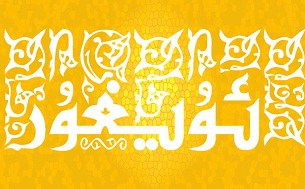Anyone researching the Turkic people living in China’s northwestern Xinjiang region, and scattered throughout Central Asia, must almost immediately make what seems to be a major editorial decision: Are they Uyghur or Uighur people? Do they inhabit the Xinjiang Uighur or Uyghur Autonomous Region?
“Uighur,” with an “i,” has appeared for centuries in writings by Western scholars, and many Western media and experts on the region still prefer this spelling.
One early original source in English for the history of the region, British explorer T. D. Forsyth’s Report of a Mission to Yarkand in 1873, refers to “Uighur” people. Other early English spellings include “Ouighour” and “Ouigour,” derived from French and German scholars’ renderings.
But members of this mostly Muslim ethnic group overwhelmingly prefer the spelling “Uyghur,” which they say more closely approximates the proper orthography and pronunciation in their native language, “Uyƣur.” (The word sounds, when spoken, closer to “oy-gher” than “wee-ger,” as most Westerners enunciate it.)
In fact, the spelling “Uighur” suggests a different orthography in the Uyghur language itself.
“I use the ‘Uyghur’ spelling because it’s the most faithful to the way the word is written in the Uyghur script today,” said Gardner Bovingdon, a professor of Uyghur studies at Indiana University.
Different systems agree
The language is often written in the Latin alphabet, including online. Although Uyghurs use different transliteration systems when writing in the Latin alphabet instead of the modified Arabic script, all the transliteration systems agree that the Latin “i” and “y” represent different Uyghur letters.
Indeed, the word represented in Uyghur by the “Ui” spelling places two vowels in one syllable, violating the Turkic language’s own linguistic rule of vowel harmony.
Two major exile groups, the Washington-based Uyghur American Association and Munich-based World Uyghur Congress, also use this English transliteration, “Uyghur.”
Chinese authorities have, moreover, officially adopted the same spelling, although other usages by official Chinese sources are common. A circular from the Terminology Normalization Committee for Ethnic Languages of the Xinjiang Uyghur Autonomous Region, dated Oct. 11, 2006, states:
“At present, there is utter confusion on how to render and use in English the name of that nationality, with no fewer than seven different spellings attested: Uyghur, Uygur, Uighur, Uighuir, Uiguir, Uigur, and Weiwuer. This situation causes a number of problems in our work and daily lives.
“Therefore, the Terminology Normalization Committee for Ethnic Languages of the Xinjiang Uyghur Autonomous Region based on research and consultations with relevant experts on this issue recommends that the spelling Uyghur, corresponding to the pronunciation [ujγur], be used as the English transcription of the word.”
“Government organizations and individuals are invited to conform to the present notice,” the circular says.
But China’s official news outlets often use “Uighur” or “Uygur” in their English reports.
“If Beijing is going to be ‘Beijing’ [e.g. instead of ‘Peking’] because that’s how the government in Beijing wants it to be known, then Uyghurs have the right to decide how to spell the name,” Bovingdon said.
“And the Uyghurs I know who are intellectuals and concerned with transcription spell it “Uyghur.”
— Reported in Washington by Rachel Vandenbrink.



